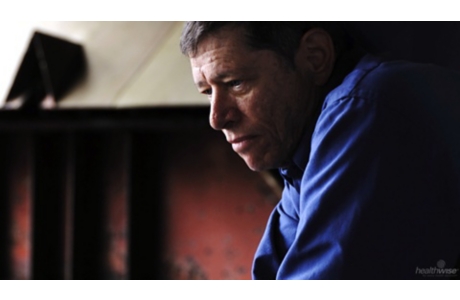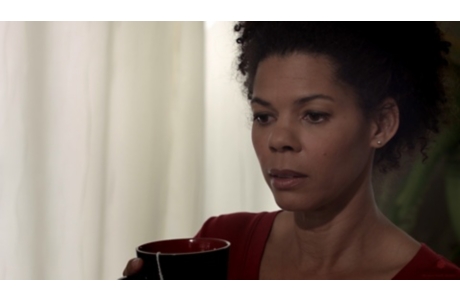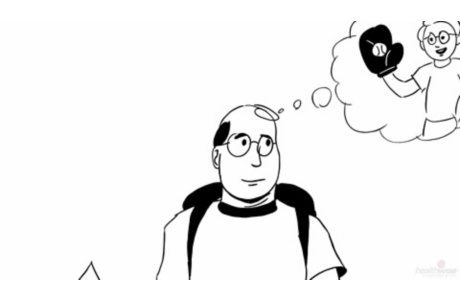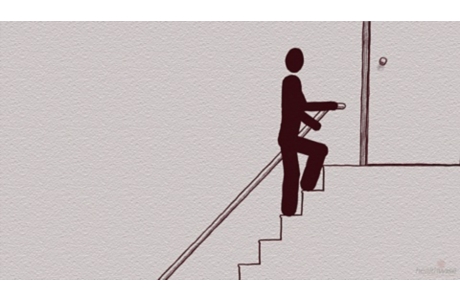Substance Use Disorder
Topic Overview
Is this topic for you?
This topic is about substance use disorder in adults. For information about drug use in teens or children, see the topic Teen Alcohol and Drug Use.
What is substance use disorder?
Substance use disorder is using drugs in a way that harms you or that leads you to harm others. It can range from mild to severe. Moderate to severe substance use disorder is sometimes called addiction.
This disorder can develop from the use of almost any type of substance. This includes alcohol, illegal drugs, prescription drugs, or over-the-counter drugs.
When you have substance use disorder, you are not always able to meet work, home, or school duties. You may be late to work. You may use drugs in dangerous situations, such as when driving or operating machines. Or drugs may cause problems in your relationships.
People who have it find it hard to control substance use. Any of the following can happen:
- You take more of the drug over longer periods of time and need more of the drug to feel “high.”
- You try to quit using the drug, but you are not able to.
- You continue to use the drug even though it harms your relationships and causes you to develop physical problems.
- If you stop using the drug, you feel sick. This is known as withdrawal.
Substance use disorder is a disease. It’s not a weakness or a lack of willpower. It’s your choice to begin using a drug. But as you use it more, your brain begins to change. This change can lead to a craving to use the drug, and this can influence how you act.
Which drugs might be a problem?
Drugs that may lead to substance use disorder include:
- Marijuana, cocaine, and hallucinogens, such as LSD (lysergic acid diethylamide), mescaline, psilocybin, PCP (phencyclidine), and ketamine.
- Inhalants, such as glues, aerosol sprays, gasoline, paints, and paint thinners.
- Club drugs, such as ecstasy (MDMA).
- Methamphetamine, which is called meth, crank, or speed.
- Opioids, such as heroin, morphine, and codeine.
- Prescription drugs, such as diazepam (Valium), hydrocodone and acetaminophen (Norco), methylphenidate (Ritalin), and oxycodone (OxyContin).
- Over-the-counter medicines, such as cough syrups and cold pills.
What are the signs of substance use?
Behaviors that may be signs of substance use include:
- Changes in sleeping or eating habits, less attention to dressing and grooming, or less interest in sex.
- Up-and-down moods, a mood or attitude that is getting worse, or not caring about the future.
- Sneaky behavior, lying, or stealing.
- Poor family relationships, or relationships that are getting worse.
- New problems at work or school, or problems with the law.
Having these signs doesn’t always mean a person is using drugs. The behavior could be because of work or school stress, or it could be a sign of depression or another medical problem. But behavior changes like these are common in people who use drugs.
Physical signs of drug use include:
- Red eyes, a sore throat, a dry cough, and feeling tired.
- Needle marks on the arm or other area of the body.
- Small, “pinpoint” pupils in the eyes.
- Losing weight without trying to, or not feeling like eating.
- Changes in sleep behavior, such as not sleeping as well.
- Seeing things that don’t exist (hallucinations).
How is substance use disorder diagnosed?
Substance use disorder may be diagnosed at a routine doctor visit or when you see your doctor for a health or social problem linked to drug use, such as anxiety, depression, or family conflict. If a partner or friend thinks you have substance use disorder, he or she may urge you to see your doctor.
Your doctor will ask questions about your symptoms and past health. He or she will do a physical exam and sometimes a mental health assessment.
How is substance use disorder treated?
Treatment includes medicine, therapy, and support groups.
The first step in treatment is to quit using drugs. You may need medical care to manage withdrawal symptoms when you first quit. Some people call this detoxification, or detox.
After you stop using drugs, you focus on staying drug-free. Most people receive some type of therapy, such as group counseling. You also may need medicine to help you stay drug-free.
When you have stopped using drugs, you have taken the first step toward recovery. To gain full recovery, you need to take steps to improve other areas of your life, such as learning to deal with your work, family, and living situation in healthy ways. This makes it easier to stay drug-free.
What can you do if you or another person has a problem with drugs?
If you are worried about your substance use, get help. You can visit a doctor or go to a self-help group. The earlier you get help, the easier your recovery will be for you and your family.
Helping someone who has substance use disorder is hard. If you are “covering” for the person, you need to stop. For example, don’t make excuses for the person when he or she misses work.
You may be able to help by talking to the person about what his or her drug use does to you and others. Talk to the person in private, when he or she isn’t using drugs or alcohol and when you are both calm. If the person agrees to get help, call for an appointment right away. Don’t wait.
Cause
Most of the time, substance use disorder starts with the occasional use of a drug. People don’t use drugs because they want to develop a substance use disorder. Drugs can make you feel good for a while. They may make you feel energetic, self-confident, and powerful. You may take a drug to reduce stress or anxiety or to help you forget a problem.
Drug use changes your brain and how it works. If you continue to use drugs, you may develop strong cravings for them, and it may get harder to say “no” to further use. At the same time, you may begin to lose interest in activities you always enjoyed. This is because you may feel that they are not as enjoyable as using drugs.
Not everyone who uses drugs develops substance use disorder. Other things that influence whether this happens include your genes, family, friends, and life situations. For more information, see What Happens and What Increases Your Risk.
Symptoms
You may have substance use disorder if two or more of the following are true. The more signs of this disorder you have, the more severe it may be.
- You use larger amounts of the substance than you ever meant to. Or you’ve been using it for a longer time than you ever meant to.
- You can’t cut down or control your use. Or you constantly wish you could cut down.
- You spend a lot of time getting or using the substance or recovering from the effects.
- You have strong cravings for the substance. You can no longer do your main jobs at work, at school, or at home.
- You keep using, even though your substance use hurts your relationships.
- You have stopped doing important activities because of your substance use.
- You use substances in situations where doing so is dangerous.
- You keep using the substance even though you know it’s causing health problems.
- You need more and more of the substance to get the same effect, or you get less effect from the same amount over time. This is called tolerance.
- You have uncomfortable symptoms when you stop using the substance or use less. This is called withdrawal.
People with substance use disorder are more likely to have changes in their behavior than to have physical symptoms.
Changes in behavior
- Changes in sleeping or eating habits, less attention to dressing and grooming, or less interest in sex.
- Up-and-down moods, a mood or attitude that is getting worse, or not caring about the future.
- Anger toward others, or treating others badly.
- Sneaky behavior, lying, or stealing.
- Poor family relationships, or relationships that are getting worse.
- New problems at work or school, or problems with the law.
- Not keeping up with old friends and activities, and finding new friends and not wanting old friends to meet them.
These signs don’t always mean a person is using drugs. The behavior could be because of work or school stress, or it could be a sign of depression or another medical problem. But behavior changes like these are common in people who use drugs.
Physical signs of drug use
- Red eyes, a sore throat, and a dry cough.
- Needle marks on the arm or other area of the body.
- Small, “pinpoint” pupils in the eyes.
- Losing weight without trying to, or not feeling like eating.
- Changes in how well you sleep.
- Seeing things that don’t exist (hallucinations).
Symptoms in older adults
Substance use disorders in older adults may be harder to notice. Older adults often take more medicines, such as sleep medicines and painkillers, that can lead to substance use disorder.
Symptoms of withdrawal
When you are physically dependent on a drug and you use less or stop using it, you may have physical symptoms known as withdrawal. These symptoms differ for each drug. They can include feeling sick to your stomach, vomiting, having belly pain, sweats, nervousness and shaking, and seizures.
What Happens
You may not feel that using drugs is a problem. Maybe you feel this way because you use drugs only now and then. Or you may feel that you can stop using drugs at any time.
But drug use quickly can become a habit, and for many people it may lead to a substance use disorder. You may begin to use drugs without thinking about how drugs can harm you and those you care about.
How drugs affect your health
Drugs can cause you to have health problems, such as:
- Overdose and death.
- Heart disease.
- Stroke.
- Depression.
Drugs also can lead to problems with thinking and remembering. They can affect judgment, decision-making, emotions, and learning.
Different drugs harm your body in different ways. Drugs that can cause harm include:
How drugs affect your life
You are more likely to have unsafe sex when on drugs, and you may get and spread sexually transmitted infections (STIs).
If you’re pregnant, drugs can pass into your uterus and harm your baby.
Drug use also can lead to problems with your partner, family, or friends. You and your family may feel that you have turned against each other. You may be angry at them, and they may be angry at you. You may do poorly at work or in school, or you may even quit. You also can have legal problems, like being arrested for driving while on drugs or for using or selling drugs.
What Increases Your Risk
Not everyone who uses a drug develops substance use disorder. Certain things make this disorder more likely. These are called risk factors.
Genetic and health risk factors
- Genes. People who have substance use disorder often have a family history of drug use. Genes may influence whether you use drugs and whether you develop substance use disorder.
- Gender. More men than women use drugs. But the rate of misusing prescription drugs is similar in men and women.
- Your mental health. If you have a mental health problem, such as depression, post-traumatic stress disorder (PTSD), or an anxiety disorder, you are more likely to use drugs. Treating mental health problems makes drug use less likely. And if you’re using drugs, treating mental health problems makes recovery more likely.
Social risk factors
- Early use. The earlier you began to use drugs, the more likely you are to get substance use disorder. This may be because early drug use changes the developing brain.
- How you use. If you smoke a drug or inject it into a vein, you are more likely to develop substance use disorder. These methods give you a fast and intense “high,” but you lose the high quickly and then feel low. This may make you use the drug more often.
- The drug you use and how strong the drug is. Some drugs, such as heroin and cocaine, are so strong that it is possible get substance use disorder no matter how you use them.
- Environment. If you live in an area where drugs are easy to get and where drug use is common, you are more likely to use drugs.
- Family and friends. You are more likely to use drugs if your family members or friends use them.
- Problems with others. You may be more likely to use drugs when you are having problems in your family or with friends.
- Not having purpose or satisfaction in your life. If you have no activities that give you a sense of purpose, you may be more likely to use drugs.
When to Call a Doctor
Call 911 or other emergency services right away if you or someone else:
- Has overdosed or has withdrawal signs. Be sure to tell the emergency workers that you are or someone else is using or trying to quit using drugs. Overdose or withdrawal signs may include:
- Losing consciousness.
- Seizure.
- Seeing or hearing things that aren’t there (hallucinations).
Call your doctor if:
- You think you have a problem with drugs.
- You are having withdrawal symptoms. These may include nausea or vomiting, sweating, shakiness, and anxiety.
Who can treat substance use disorder?
Health professionals who can diagnose, prescribe medicine for, and treat substance use disorder include:
- General practitioners.
- Psychiatrists.
- Physician assistants.
- Nurse practitioners.
- Psychologists and drug counselors. These professionals cannot prescribe medicine.
Counseling usually is part of treatment. This can be done by:
Watchful waiting
Watchful waiting is a wait-and-see approach. If you get better on your own, you won’t need treatment. If you get worse, you and your doctor will decide what to do next.
Watchful waiting is not a good choice for substance use disorder. If you have this disorder, or if you believe that your health or other areas of your life are being affected by drugs, you need to take steps to stop using drugs.
Exams and Tests
Substance use disorder may be diagnosed during a routine doctor visit or when you see your doctor for a health or other problem linked to drug use, such as anxiety, depression, or family conflict. If your partner or a friend is worried about your drug use, he or she may urge you to see your doctor.
Testing to see if you have substance use disorder
Your doctor will ask you questions about your symptoms and past health and will do a physical exam. If your doctor thinks you have substance use disorder, he or she may ask about current and past drug use. He or she also may ask if it’s okay to give you a test to check for drug use, such as a urine or blood test.
Your doctor may ask to give you tests to look for health problems related to drug use. These may include tests for hepatitis B, hepatitis C, or HIV.
If you and your doctor agree that you have substance use disorder, your doctor probably will refer you to a specialist.
Testing for mental health problems
People who use drugs also may have mental health problems. These include depression, anxiety disorders, or post-traumatic stress disorder (PTSD). If your doctor thinks this may be true for you, he or she may do a mental health assessment.
If you use drugs and have a mental health problem, it’s called a dual diagnosis. If you treat only one problem, treatment may not work well. When you treat both problems, you have a better chance of a full recovery and less chance of using drugs again.
Treatment
Treatment for substance use disorder usually includes group therapy, one or more types of counseling, and drug education. A 12-step program is often part of treatment and continues afterward as part of your recovery.
Treatment doesn’t just deal with drugs. It helps you take control of your life so you don’t have to depend on drugs. You’ll learn good reasons to quit drugs. Staying drug-free is a lifelong process that takes commitment and effort.
Seeking treatment
You might start with your family doctor, or your doctor may recommend that you enter a treatment facility. A friend could bring you to a self-help group, such as Narcotics Anonymous, or you might walk into a clinic that deals with drug use.
You may have a treatment team to help you. This team may include a psychologist or psychiatrist, counselors, doctors, social workers, nurses, and a case manager. A case manager helps plan and manage your treatment.
You may be asked questions about your drug use, health problems, work, and living situation. Be open and honest to get the best treatment possible. Your team may write a plan, which includes your treatment goals and ways to reach those goals. This helps you stay on track.
Detoxification
Your doctor may decide you need medical care to manage withdrawal symptoms when you first quit using drugs. This is sometimes called detoxification, or detox.
People who are physically dependent on drugs often have to go to a hospital or treatment facility. Detox usually is done under the care of a doctor, because withdrawal can be dangerous without medical care. A doctor may prescribe medicines to help with withdrawal symptoms.
Therapy
Treatment for substance use disorder usually involves one or more types of therapy.
- In group therapy, you talk about your recovery with other people who are trying to quit.
- In cognitive-behavioral therapy (CBT), you learn to change the thoughts and actions that make you more likely to use drugs.
- With motivational interviewing (MI), you resolve mixed feelings you have about quitting and getting treatment.
- Motivational enhancement therapy (MET) uses motivational interviewing to help you find motivation to quit and get you started toward recovery.
- Couples or family counseling can help you to stop using drugs, stay drug-free, and improve your relationships with your partner and family.
Treatment usually includes going to a support group, such as going to Narcotics Anonymous (NA) meetings. Your family members might also want to attend a support group such as Nar-Anon.
Medicines
You may take medicines to help you quit or to help you overcome withdrawal symptoms. Medicines often are used for physical dependence on opioid drugs like heroin or certain painkillers. Medicines that can help you include methadone (such as Dolophine) or naltrexone (such as ReVia).
Treatment programs
Treatment programs can be outpatient, inpatient, or residential. They offer similar therapies. Your treatment team can help you decide which type of program is best for you.
- In outpatient treatment, you regularly go to a mental health clinic, a counselor’s office, a hospital clinic, or a local health department for treatment.
- In inpatient treatment, you stay at a hospital and have therapies during the day or evening. You most likely will then go to outpatient therapy.
- Residential treatment provides a place for you to live for 6 months or more while you recover. You get therapy and 24-hour care.
Some treatment programs give rewards, called vouchers, when you stay off drugs. The rewards may get bigger when you go for a long time without drugs.
Many programs give regular drug tests while you go through treatment. Knowing that you will be tested can make you more likely to resist your cravings.
What to think about
People with drug problems often have other problems. They may need other treatments, or other resources may be available to help them with the drug problem.
- If you have substance use disorder and a mental health problem, you will need treatment for both problems. Doctors call this a dual diagnosis.
- Older adults also may have substance use disorder because of misuse of prescription medicines such as painkillers or sleeping pills.
- Drug use in the military is like drug use in the general population. But there may be other concerns, such as post-traumatic stress disorder or military sexual trauma.
- Some people are sent to drug treatment because of a court decision. This may happen if you have a substance use disorder and you commit a crime. A court may require treatment and then keep track of your progress. Treatment often is available in prison.
Medicines
Your doctor may prescribe medicine during detoxification to ease withdrawal symptoms or during treatment to help control cravings and prevent relapse. These medicines are mainly used for physical dependence on heroin or other opioids.
Medicines that can help include:
- Buprenorphine, such as Subutex. Buprenorphine works by targeting the same places in the brain that opioids do.
- Methadone, such as Dolophine. It stops you from getting the quick “high” of opioid drugs.
Recovery
Recovery from substance use disorder means finding a way to stay drug-free while changing your attitudes and behaviors. In recovery, you work to restore relationships with your family and friends and with people at your job or school.
To help stay drug-free after treatment, you can find things to do, such as sports or volunteer work. Stay away from friends or family members who use drugs. Learn how to say “no” to alcohol and drugs.
Support
An important part of recovery is being sure you have support. You can:
- Develop and use social support and support groups. Support comes in many forms. You can find it in seminars and groups led by professionals, in 12-step groups, and in your relationships with family and friends. You can make support groups more helpful by being an active member.
- Connect with family and friends. They can help you by encouraging positive steps. But you have to be honest about your problems.
- Take part in recovery group activities. You may have used drugs to make friends or be with a social group. Your counselor or doctor can help you learn skills to make friends without using drugs.
- Find a sponsor, and work with this person. A sponsor is someone who has been in recovery for a long time and helps you stay drug-free.
Lapse and relapse
Stopping drug use is very hard. It’s normal to have setbacks, even years later. Very few people succeed the first time they try. A lapse or relapse is likely.
- A lapse is the first time you use a drug again after you have quit, or brief episodes of drug use later on.
- A relapse is not being able to stay drug-free over time. It can occur if you have a series of lapses close together or a lapse that leads to heavier drug use over a longer period. A relapse is most likely to happen a few months after you have quit using drugs.
A lapse or relapse doesn’t mean that you or your treatment has failed. It may mean that you just slipped up. You also may need more treatment, another type of treatment, or more time in support groups such as Narcotics Anonymous.
It’s smart to plan for a relapse before it happens. Your doctor, family, and friends can help you do this.
A healthy lifestyle
Part of recovery is finding your way back to a healthy lifestyle.
- Exercise and be active. This may give you something to do instead of thinking about drugs, and it also can help reduce stress.
- Relieve stress. Stress can trigger a relapse. Stress-relief exercises can help.
- Get enough sleep to help your mood and to help you feel less stressed.
- Eat a balanced diet. This helps your body deal with tension and stress. Whole grains, dairy products, fruits, vegetables, and protein are part of a balanced diet.
- Meditate. It helps you feel calm and can give you a clearer awareness about your life.
For Family and Friends
If someone you care about has substance use disorder, you know how hard it can be. You know how living with or being close to someone who has problems with drug use can change your life. But family members and friends can play an important role in helping a loved one recover from substance use disorder.
Encourage treatment
It’s hard to get someone who uses drugs into treatment if he or she doesn’t want it. You may be able to help the person get treatment by:
- No longer making excuses, such as covering up for missed work or missed activities with children. Don’t lie or stretch the truth to help the person.
- Finding a good time to talk to the person. Say clearly how the person’s drug use is harming you and that you will take action if he or she doesn’t seek help.
- Being ready and able to help when a decision is made to get treatment.
Help with treatment and recovery
After the choice for treatment has been made:
- Make sure the home contains no drugs or items that help people use drugs.
- Be involved and patient. Attend recovery meetings with your loved one, and be supportive. Know that it may take a long time for you to trust and forgive the person and for the person to forgive himself or herself.
- Be aware that your loved one may seem like a different person after he or she is drug-free. You may need to build a new relationship.
- Understand that you have the right to know how recovery is going, but you should ask about it in a respectful way.
- Help your loved one plan for a relapse. Most people relapse after treatment. This doesn’t mean that the treatment failed. Try to help your loved one see relapse as a chance to do better and keep working on skills to avoid drug use.
- Focus on the positive actions your loved one is making.
Prepare for complex emotions
You probably will feel relief and happiness when the person decides to get help. But treatment and recovery mean changes in your life too. Your emotions may become more complicated. You may:
- Resent what the person did to you in the past.
- Not trust the person. You may not want to give the person the house key, the car key, or money. You also may feel guilty about not trusting the person.
- Find it hard to give up or share your family role. For example, if you took over raising your child or children when your partner was using drugs, you may resent him or her becoming involved again.
- Resent that the person is spending more time at meetings or with others in recovery than with you.
- Worry so much about relapse that you avoid anything you feel may upset the person.
These feelings are common. You’ve been through a bad period of your life, and what happened isn’t easy to forget. Nor is it easy to forgive the person. Keep in mind that recovery is the road to a better life and that you can help your loved one get there.
Find your own support. Nar-Anon and similar programs are for people with family members or friends who have substance use disorder. They help you recover from the effects of being around someone who has this disorder. You also may try family therapy.
References
Citations
- Substance Abuse and Mental Health Services Administration, Office of Applied Studies (2010). Results From the 2009 National Survey on Drug Use and Health: Volume I. Summary of National Findings (NSDUH Series H-38A, HHS Publication No. SMA 10-4586FINDINGS). Available online: http://store.samhsa.gov/product/Results-from-the-2009-National-Survey-on-Drug-Use-and-Health/SMA10-4586FINDINGS.
- National Institute on Drug Abuse (2010). Drugs, Brains, and Behavior: The Science of Addiction (NIH Publication No. 10-5605). Available online: http://www.nida.nih.gov/scienceofaddiction/sciofaddiction.pdf.
Credits
Current as ofFebruary 5, 2019
Author: Healthwise Staff
Medical Review: Adam Husney MD – Family Medicine
E. Gregory Thompson MD – Internal Medicine
Kathleen Romito MD – Family Medicine
Martin J. Gabica MD – Family Medicine
Peter Monti PhD – Alcohol and Addiction
Christine R. Maldonado PhD – Behavioral Health
Heather Quinn MD – Family Medicine
Current as of: February 5, 2019
Author: Healthwise Staff
Medical Review:Adam Husney MD – Family Medicine & E. Gregory Thompson MD – Internal Medicine & Kathleen Romito MD – Family Medicine & Martin J. Gabica MD – Family Medicine & Peter Monti PhD – Alcohol and Addiction & Christine R. Maldonado PhD – Behavioral Health & Heather Quinn MD – Family Medicine
This information does not replace the advice of a doctor. Healthwise, Incorporated, disclaims any warranty or liability for your use of this information. Your use of this information means that you agree to the Terms of Use. Learn how we develop our content.






